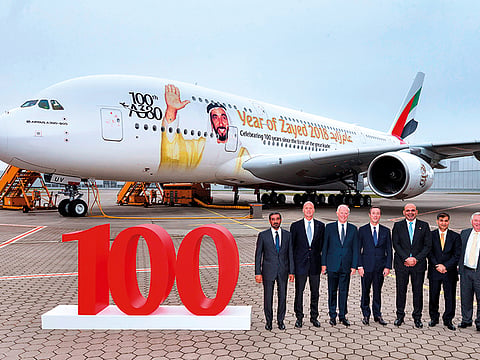Emirates optimistic on growth as it welcomes 100th A380
Ahmad denies talks of merger with Etihad Airways but says there could be cooperation

Hamburg, Germany: Emirates welcomed its 100th A380 to its fleet on Friday at a special delivery ceremony held at Airbus’ manufacturing facility in Hamburg.
Emirates is the world’s largest operator of A380 aircraft, flying the iconic double decked jet to 48 cities in six continents on scheduled services.
“For Emirates, the A380 has been a success. We’ve been able to utilise it at slot-constrained airports, as well as at regional and secondary airports where we have grown passenger demand,” said Shaikh Ahmad Bin Saeed Al Maktoum, President of Dubai Civil Aviation and Chairman and CEO of Emirates airline and Group.
“Each time we deploy an A380 onto a route, it typically stimulates further traffic and demand as travellers are attracted by our A380 experience.”
Emirates has ordered a total of 142 A380s at a total value of $61 billion (Dh224 billion). Forty two aircraft are expected to be delivered in the coming years.
The airline receives on average eleven A380 deliveries per year, starting from its first aircraft in August 2008. In its 2016/17 financial year, Emirates received a record nineteen new A380 aircraft.
“We remain committed to the programme and will work closely with Airbus and our partners to continually enhance our A380 products as we look ahead to receiving our remaining 42 aircraft on order.”
No merger of Etihad and Emirates
Shaikh Ahmad denied talks of a merger between Emirates and Etihad airlines while interacting with the media in Hamburg but said there could be cooperation between the two airlines.
“When it comes to the area of cooperation, we welcome and it can be in many ways like fuel purchase, insurance, parts and so on but there is no merger.”
When asked by Gulf News on what the next phase of cooperation between Emirates and flydubai will be, he said the current partnership has been positive for both airlines.
“I think we started with 29 destinations on code sharing and were testing it for the last couple of weeks. It’s been positive and that’s encouraging our two teams to work on expanding this further. That will be a really good opportunity for Emirates and flydubai to benefit out of this. It is not a merger but more of cooperation between the two airlines.”
The partnership between the two airlines which was announced earlier this year includes code-sharing, network collaboration, and coordinated scheduling.
On challenges for Emirates airline in the coming years, he said there are many including bilateral issues and other challenges.
“We are determined and focused to achieve our targets and objectives. The world will never be free from challenges and crisis and so on. We are always there to deal with it.”
Future deliveries
On more new A380 aircraft orders, he said discussions are going on but they are still waiting for 42 aircraft to be delivered in the coming three years.
The Emirates A380 programme creates and supports manufacturing jobs across the global aircraft manufacturing supply chain. Airbus estimates that Emirates’ A380 orders alone support 41,000 direct, indirect and induces jobs in Europe, including some 14,500 in Germany alone.
The estimated Europe-wide impact of Emirates’ A380 investment amounts to €3.4 billion in GDP in 2013/14.
The airlines unveiled a special tribute to His Highness Shaikh Zayed Bin Sultan Al Nahyan, founding father of the UAE with bespoke livery for its 100th A380.
Factbox: Routes and operations
Airbus on Friday said they have delivered 218 A380s to 13 operators since 2007 with Emirates being its largest customer followed by Singapore Airlines, Lufthansa, British Airways, Qantas, among others.
More than 120 A380 routes are operated by 13 airlines in sixty destinations. Currently, 240 airports can accommodate the A380 around the world with the aircraft taking off or landing every two minutes.
In the UAE, Strata produces composite components for A330, A330neo, A350 XWB and A380 aircraft while Tawazun Precision industries manufactures metallic parts for the A320, A320neo and A330 programmes.



